Search the Special Collections and Archives Portal
Search Results
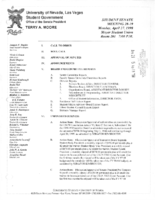
Meeting minutes for Consolidated Student Senate University of Nevada, Las Vegas, April 27, 1998
Date
Archival Collection
Description
Text
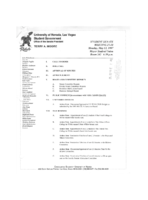
Meeting minutes for Consolidated Student Senate University of Nevada, Las Vegas, May 12, 1997
Date
Archival Collection
Description
Text
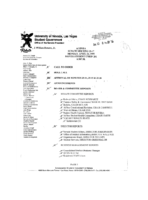
Meeting minutes for Consolidated Student Senate University of Nevada, Las Vegas, April 24, 1995
Date
Archival Collection
Description
Text
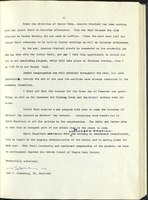
Minutes from Temple Beth Sholom Board of Directors meetings, May 1974 - May 1975
Date
Archival Collection
Description
The meeting minutes of the board of directors of Temple Beth Sholom include the proceedings of meetings held from 1973 to 1974.
Text
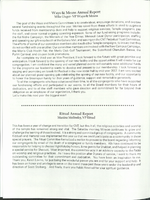
Annual report from Congregation Ner Tamid, 2006
Date
Archival Collection
Description
Annual report from Congregation Ner Tamid, 2006
Text
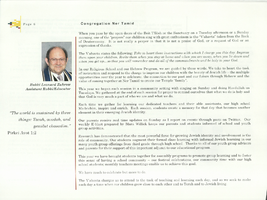
Annual report from Congregation Ner Tamid, 2010-2011
Date
Archival Collection
Description
Annual report from Congregation Ner Tamid, 2010-2011
Text
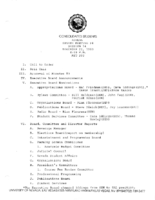
Meeting minutes for Consolidated Student Senate, University of Nevada, Las Vegas, November 22 1983
Date
Archival Collection
Description
Text
Layke Martin Conine (Nevada Cannabis Association) oral history interview conducted by John Hudak and Kristian Thymianos: transcript
Date
Archival Collection
Description
From the Lincy Institute "Perspectives from the COVID-19 Pandemic" Oral History Project (MS-01178) -- Business interviews file.
Text
Florence Lee Jones Cahlan Photographs
Identifier
Abstract
The Florence Lee Jones Cahlan Photographs depict locations and events in Las Vegas, Nevada from 1909 to 1980. The photographs primarily depict historical locations, including the Las Vegas Mormon Fort, the Kiel Ranch, and plaques commemorating Las Vegas’s 75th anniversary. The photographs also depict celebrations, including the Diamond Jubilee festivities held to celebrate Las Vegas’s 75th anniversary, plaque dedications, building dedications, and the 50th anniversary of the arrival of the first mail planes in Las Vegas. The photographs include the Kennecott Copper Corporation’s facilities in McGill, Nevada, Western Airlines planes and pilots, and Union Pacific Railroad locomotives.
Archival Collection
Art Wolf Professional Papers
Identifier
Abstract
The Art Wolf Professional Papers (1988-2018) document the career of museum professional and consultant Art Wolf who specialized in supporting cultural heritage of indigenous communities, particularly in the Southwest and Las Vegas, Nevada. Materials document Wolf's work with the American Alliance of Museums (AAM) as a board member, in conference planning, and as a Study Leader for Smithsonian Associates Study Tours. Also included are materials that represent Wolf's involvement as an alumni of the Leadership Las Vegas program and director of the Nevada State Museum. The collection includes some ephemera and invitations to different events held in Las Vegas, Nevada that Wolf was invited to. The collection also includes examples of unsuccessful bids for consultancy jobs through WOLF Consulting and his files as a master's thesis adviser for the Museum Studies program at Harvard Extension School.
Archival Collection
